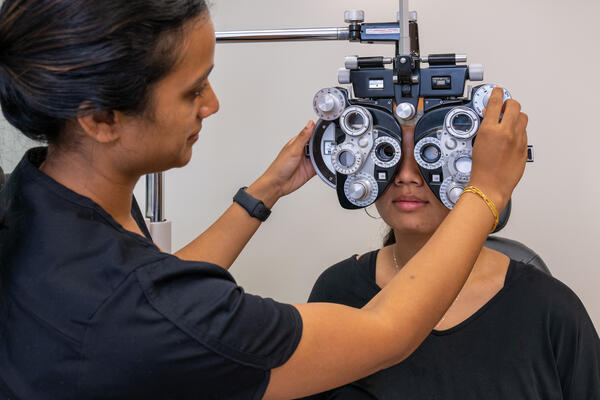Discover a Neurologist in Andalusia: Specialized Clinics and Care Providers
Discover a Neurologist in Andalusia: Specialized Clinics and Care Providers
Blog Article
Browsing the Maze of Refractive Surgeries: Which Procedure Is Right for You?
In the realm of refractive surgical procedures intended at fixing vision, the selection of readily available procedures can frequently appear like a labyrinth, each guaranteeing to use quality and precision. As individuals consider starting the journey in the direction of more clear sight, the essential question arises: which treatment is undoubtedly one of the most ideal option? Browsing this elaborate puzzle includes recognizing the subtleties of various options, thinking about personal elements that play a crucial function in decision-making, and discerning the differences between preferred vision correction techniques. Among this intricacy lies the guarantee of tailored services that provide to specific requirements, making the pursuit for the right refractive surgical procedure a highly customized and elaborate process. The look for the perfect treatment demands a careful analysis of several elements, eventually bring about the option of a path that straightens perfectly with one's unique demands.
Comprehending Refractive Surgical Procedure Options

Aspects to Think About Before Selecting
Choosing the most ideal refractive surgical treatment calls for a detailed analysis of various aspects to guarantee ideal outcomes for every individual. Prior to choosing a treatment, a number of vital factors to consider should be taken right into account. First of all, the person's general eye health and particular vision improvement needs play a vital function. Aspects such as the seriousness of refractive error, corneal density, student dimension, and visibility of any eye conditions should be completely examined by a qualified eye doctor. In addition, the security of the client's vision prescription over time is necessary to determine the relevance of surgery.
Additionally, way of living aspects should not be forgotten. Clients with active way of livings or specific work demands might benefit much more from specific procedures. For instance, individuals included in call sporting activities may go with treatments like PRK over LASIK due to the decreased danger of flap problems. Financial considerations, consisting of the price of surgery, prospective insurance coverage, and post-operative treatment costs, must additionally be factored right into the decision-making procedure. By carefully considering these consider consultation with a relied on eye care company, individuals can make educated choices relating to the most suitable refractive surgical procedure alternative for their distinct demands.
Comparing Popular Vision Modification Procedures
Taking into consideration the various aspects that affect the choice of a refractive surgical treatment, it is critical to contrast preferred vision modification treatments to determine the most suitable choice for specific requirements. Two well-known treatments are LASIK (Laser-Assisted sitting Keratomileusis) and PRK (Photorefractive Keratectomy)
LASIK includes developing a slim flap click now on the cornea, reshaping the underlying tissue with a laser, and after that rearranging the flap. It supplies rapid healing and minimal discomfort, with the majority of clients experiencing improved vision virtually instantly. On the other hand, PRK entails removing the external layer of the cornea before reshaping it with a laser. Although the recovery period is much longer contrasted to LASIK, PRK is a much better alternative for individuals with thin corneas or particular corneal irregularities. eye center andalusia.
When comparing these procedures, factors like corneal density, eye wellness, and wanted recuperation time should be meticulously taken into consideration. Consulting with an experienced ophthalmologist is crucial to identify the most ideal procedure based upon a person's details requirements and eye health status.
Customized Treatments for Specific Demands
Tailoring refractive surgeries to fulfill one-of-a-kind patient requirements is important in achieving optimal aesthetic results and contentment prices. Custom-made treatments think about private elements such as prescription strength, corneal thickness, student size, and way of living factors to consider to identify one of the most appropriate procedure for each individual. Advanced innovations like wavefront-guided or wavefront-optimized treatments make it possible for specialists to deal with higher-order aberrations and enhance aesthetic high quality beyond what traditional treatments can provide.

Locating the Right Cosmetic Surgeon for You
When looking for a specialist for refractive surgery, it is critical to focus on experience and experience in the area. The surgeon you select will play a considerable duty in the success of your procedure and the result of your vision. To find the right surgeon for you, take into consideration variables such as their certifications, field of expertise in refractive surgeries, and the variety of treatments this link they have performed.
Start by researching potential specialists and their credentials. Seek eye doctors who are board-certified and have details training in refractive surgical treatment. Additionally, testimonial patient endorsements and before-and-after pictures to determine the surgeon's record of effective outcomes.
Throughout examinations, inquire about the doctor's experience with the specific treatment you are considering. Ask about their difficulty rates, success prices, and just how they take care of any kind of prospective threats connected with the surgical treatment. A experienced and experienced cosmetic surgeon will certainly not only have the technological competence but likewise the ability to personalize the therapy to your individual demands, ensuring the very best possible results for your vision improvement journey.
Final Thought
In find more information final thought, when thinking about refractive surgeries, it is critical to understand the readily available choices, factors to take into consideration, and the distinctions in between preferred treatments. Discovering an experienced doctor that can lead you via the puzzle of choices is paramount in ensuring a successful vision correction treatment.
In the world of refractive surgical treatments aimed at fixing vision, the range of available procedures can usually seem like a maze, each assuring to offer clearness and accuracy. One typical treatment is LASIK (Laser-Assisted in Situ Keratomileusis), where a laser reshapes the cornea to fix refractive errors such as nearsightedness, astigmatism, and farsightedness. Customized therapies take into account private factors such as prescription toughness, corneal thickness, pupil dimension, and way of life considerations to determine the most ideal treatment for each person. To find the best cosmetic surgeon for you, take into consideration factors such as their credentials, field of expertise in refractive surgical treatments, and the number of treatments they have actually carried out.
In verdict, when taking into consideration refractive surgical procedures, it is critical to recognize the available choices, factors to take into consideration, and the differences between prominent procedures. - cardiologist andalusia
Report this page